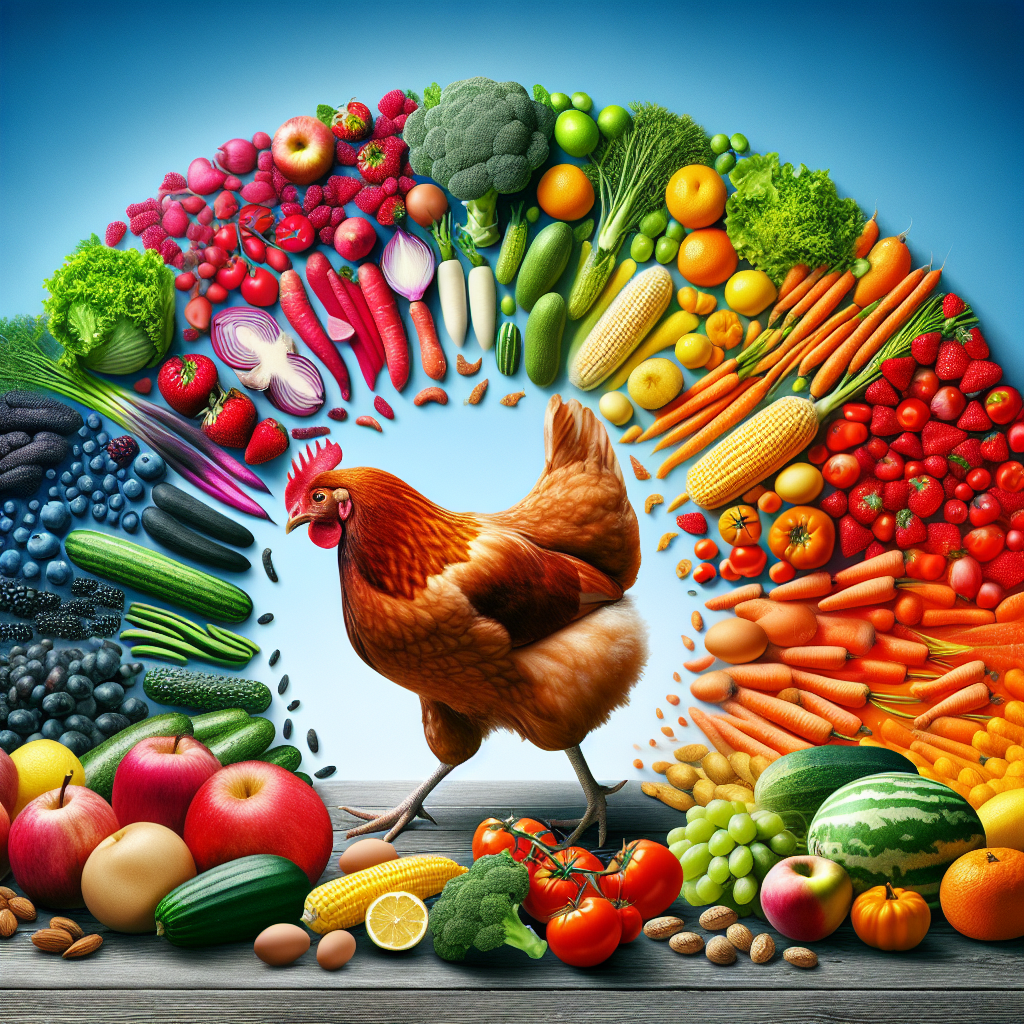Have you ever wondered how the changing seasons affect the nutritional needs of chickens? As the weather shifts from hot to cold and the landscape transforms, so too does a chicken’s dietary requirements. Understanding the impact of these seasonal changes is crucial for ensuring the health and well-being of these feathered friends. In this article, we will explore the fascinating relationship between seasonality and chicken nutrition, shedding light on the unique dietary demands that arise throughout the year.
Seasonal Changes and Nutritional Needs
Understanding the Relationship
Seasonal changes have a significant impact on the nutritional needs of chickens. Just like humans, chickens also experience changes in their bodies and behaviors as the seasons change. These changes can be attributed to factors such as temperature, daylight duration, and availability of food sources. Understanding how these seasonal changes affect chickens’ nutritional needs is crucial for ensuring their health and well-being throughout the year.
Factors Influencing Nutritional Needs
Several factors influence the nutritional needs of chickens during different seasons. These factors include changes in energy requirements, environmental conditions, access to specific types of feed, and the physiological needs for optimal egg production. By addressing these factors, chicken owners can provide their flock with a balanced diet and ensure that their nutritional needs are met during each season.
Spring Season
Increased Energy Requirements
As the weather gets warmer and daylight hours increase, chickens become more active during the spring season. This increased activity level translates to higher energy requirements for the birds. To meet these energy needs, it is crucial to provide them with a diet that contains an appropriate balance of carbohydrates, proteins, and fats. This will help support their overall energy levels and promote healthy growth and development.
Balancing Macro and Micronutrients
During the spring season, hens may begin laying, increasing their demand for certain nutrients, such as calcium and protein. It is essential to ensure that the birds’ diet is well-balanced in terms of macro and micronutrients. Providing them with a combination of a nutritionally complete commercial feed and access to fresh pasture or forage can help meet their increased dietary requirements.
Environment and Fertility
Spring is also a time when chickens’ reproductive systems become more active, making fertility and successful breeding crucial concerns. Nutrition plays a vital role in supporting good reproductive health. A diet rich in essential vitamins and minerals, particularly those that support reproductive function, can help improve fertility rates and ensure successful hatching of healthy chicks.
Access to Pasture and Fresh Forage
One of the benefits of the spring season is the availability of lush pastures and fresh forage. Allowing chickens access to these natural food sources not only enriches their diet but also provides them with additional nutrients and vitamins. The exposure to fresh grass and insects can also contribute to stronger immune systems and overall bird health.
Summer Season
Hydration and Electrolyte Balance
Summer brings higher temperatures, which can lead to increased water loss and the risk of dehydration for chickens. Ensuring that chickens have access to clean, fresh water at all times is essential. Additionally, providing electrolyte supplements can help replenish electrolyte levels and maintain hydration during the hot summer months.
Heat Stress Management
Chickens are susceptible to heat stress, especially in hot and humid climates. Heat stress can lead to decreased feed intake, suppressed egg production, and overall decreased performance. To manage heat stress, it is crucial to provide proper ventilation in the coop, shade, and cool water sources. These measures will help keep chickens comfortable and minimize the negative impact of high temperatures.
Feeding in Hot Weather
During summer, chickens may have lower feed intake due to the heat. It is important to provide easily digestible and nutrient-dense feed options to meet their nutritional needs. Consider offering smaller, more frequent meals and feed during the cooler parts of the day to encourage regular eating patterns. Additionally, incorporating feed additives such as probiotics can support gut health and maximize nutrient absorption.
Supporting Feather Health
Chickens molt and regrow their feathers during summer. Feathers play a crucial role in protecting birds from extreme temperatures and environmental stressors. Providing a diet that is rich in essential amino acids, such as methionine, can support feather health and ensure the growth of strong and vibrant plumage.
Fall Season
Preparing for Winter
As the weather starts to cool down in the fall, chickens begin preparing for the colder winter months. This preparation involves building up their fat reserves to provide insulation and a source of energy during the winter. Ensuring a well-balanced diet that includes adequate fats and carbohydrates is essential to support healthy fat deposition.
Building Fat Reserves
Chickens naturally consume more food during the fall season to build up their fat reserves. This surplus food helps sustain them during the winter months when food sources may be limited. Providing a nutritionally complete diet and monitoring their body condition can help ensure that chickens are in optimal health and have adequate fat reserves for the winter.
Transitioning to New Feed
Fall is an excellent time to transition chickens onto new types of feed, particularly feeds that are designed to support winter egg production. Gradually introducing the new feed and monitoring their response is important to ensure a smooth transition and prevent any digestive upsets. Seek advice from a poultry nutritionist or veterinarian to determine the most suitable feed for your flock.
Feeding for Winter Egg Production
In order to maintain egg production throughout the winter, it is important to provide the necessary nutrients required for optimal reproductive function. This may include increasing the protein content of the feed or supplementing with specific nutrients such as omega-3 fatty acids. Adjusting the diet according to the specific needs of the hens can help support winter egg production and overall flock health.
Winter Season
Maintaining Body Heat
Winter brings cold temperatures which can pose a challenge for chickens in maintaining their body heat. To compensate, chickens require a higher calorie intake to fuel heat production and maintain their core body temperature. Providing a higher energy diet, such as one with increased fat content, can help meet their increased energy needs during the colder months.
Increasing Energy Intake
During winter, chickens may have reduced foraging opportunities due to limited access to pasture or fresh forage. As a result, it is important to increase their energy intake through their regular feed. Offering a nutritionally dense diet that includes ingredients such as corn, wheat, or other grains can help meet their calorie requirements during this time.
Supplementing with Vitamins and Minerals
Winter weather often limits chickens’ exposure to sunlight, leading to a decreased production of vitamin D3. Supplementing their diet with vitamin D3 or ensuring access to fortified feed can help prevent vitamin deficiencies. Additionally, providing a well-balanced diet that includes a variety of minerals can help support their immune system and overall health during the winter months.
Combating Dryness and Dehydration
Winter air can be dry, which can lead to increased water loss and the risk of dehydration for chickens. Ensuring ample access to clean, unfrozen water is crucial. Regularly checking water sources and providing warm water during colder periods can help prevent water freezing and promote hydration.
Dietary Adjustments
Protein Requirements
Protein is an essential nutrient for chickens, and their requirements may vary depending on their age, breed, and the season. It is important to monitor and adjust the protein levels in their diet accordingly. Offering feed with a higher protein content during periods of increased growth, such as spring or when raising chicks, can support their overall development.
Essential Nutrients
Chickens require a variety of essential nutrients to support their health and well-being. These nutrients include vitamins, minerals, amino acids, and fatty acids. Ensuring that their diet is well-balanced and provides all the necessary essential nutrients can help prevent deficiencies and promote optimal health throughout the seasons.
Calcium and Vitamin D3
Calcium is vital for eggshell development, skeletal health, and overall egg production. Inadequate calcium intake can lead to shell abnormalities and reduced egg quality. Vitamin D3 enhances calcium absorption, making it crucial to provide adequate levels in the diet, especially during winter when sunlight exposure is limited. Offering calcium-rich feed or supplements can help meet these nutritional requirements.
Fatty Acid Balance
Fatty acids, particularly omega-3 fatty acids, are important for supporting optimal health in chickens. These fatty acids contribute to healthy skin, feathers, and egg production. Providing a well-balanced diet that includes sources of omega-3 fatty acids, such as flaxseed or fish oil, can help maintain an appropriate fatty acid balance in the chickens’ diet.
Health Considerations
Seasonal Ailments
Different seasons may bring forth specific health challenges for chickens. For example, summer can increase the risk of heat stress, while winter can lead to respiratory issues due to poor ventilation. Being aware of these seasonal ailments and implementing proper preventive measures can help minimize their impact on flock health.
Boosting Immunity
Maintaining optimal immune function is vital for chickens to combat diseases and infections. A well-balanced diet that includes essential vitamins, minerals, and antioxidants can support a strong immune system. Additionally, providing a clean and stress-free environment, proper sanitation practices, and regular flock health checks can help boost immunity and reduce the risk of diseases.
Addressing Parasitic Infestations
Seasonal changes can influence the prevalence of parasites in the environment, which can affect chickens’ health. Regularly checking for signs of parasites, such as mites or worms, and implementing appropriate prevention and treatment measures can help keep chickens healthy and free from infestations.
Managing Weight Fluctuations
Chickens’ weight can fluctuate throughout the seasons due to variations in energy requirements and feed availability. Monitoring their body condition and adjusting their diet accordingly can help prevent obesity or malnourishment. Regularly weighing chickens and consulting with a veterinarian or poultry nutritionist can help ensure appropriate weight management.
Feeding Strategies
Observing Chicken Behavior
Observing chickens’ behavior can provide valuable insights into their nutritional needs. Paying attention to their feeding patterns, energy levels, and overall health can help determine if any adjustments need to be made in their diet. If chickens appear sluggish or show decreased appetite, it may be an indication of an imbalance in their nutrition.
Free-Choice Feeding
Free-choice feeding involves providing chickens with constant access to food throughout the day. This allows them to eat as much as they need, whenever they need it. However, it is important to monitor their intake and adjust the portion sizes as necessary to prevent overeating or selective feeding. Free-choice feeding can be particularly beneficial during periods of increased energy requirements, such as during the spring or winter seasons.
Supplemental Feeding
Supplemental feeding involves offering additional sources of nutrition alongside their regular feed. This can include treats, herbs, or specific supplements that target certain nutritional needs. When offering supplemental feed, it is important to ensure that it does not exceed 10% of their total daily diet, as this may lead to imbalances or nutrient deficiencies.
Tracking Nutrient Intake
Keeping track of the nutrient intake of chickens can help identify any deficiencies or imbalances in their diet. This can be done by calculating the nutrient content of their feed and monitoring their daily consumption. Adjustments can then be made to their diet to ensure they are meeting recommended nutrient levels and their specific seasonal needs.
Consulting an Expert
Seeking Professional Advice
For optimal flock health and nutrition, it is important to seek professional advice when necessary. Consulting with experts, such as veterinarians or poultry nutritionists, can provide valuable guidance tailored to the specific needs of your flock. They can help assess your chickens’ overall health, provide recommendations for any specific dietary adjustments, and address any concerns or questions you may have.
Veterinarian Guidance
Veterinarians specialized in poultry health can provide comprehensive care for chickens, including guidance on their nutritional needs. Regular check-ups and consultations with a veterinarian can help ensure proper flock health management, early detection of diseases, and the development of effective prevention and treatment plans.
Poultry Nutritionist Consultation
Poultry nutritionists are experts in formulating balanced diets for chickens and understanding their specific nutritional requirements. Consulting with a poultry nutritionist can help develop a customized feeding plan that takes into consideration the seasonal changes and the specific needs of your flock.
Customized Feeding Plans
Every flock is unique, and their nutritional needs can vary. Working with an expert to develop a customized feeding plan can help optimize the health, productivity, and overall well-being of your chickens. By taking into account the seasonal changes and specific requirements of your flock, a customized feeding plan can ensure that their nutritional needs are met year-round.
Conclusion
Understanding the impact of seasonal changes on the nutritional needs of chickens is crucial for providing optimal care to your flock. From addressing the increased energy requirements during spring to managing heat stress in summer and preparing for winter in fall, each season brings its own challenges and opportunities. By adjusting their diet, monitoring their health, and consulting with experts when needed, you can ensure that your chickens receive the necessary nutrients to thrive in every season.




